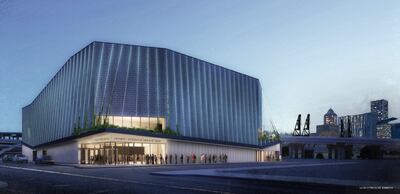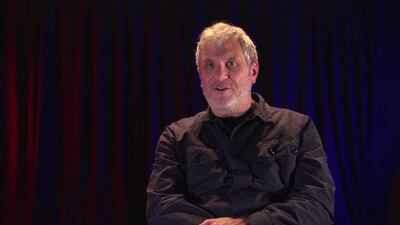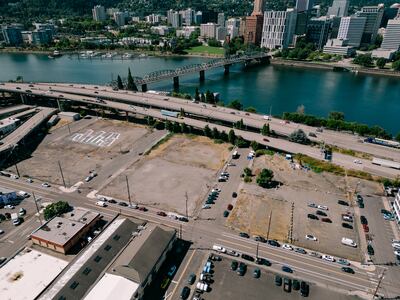The next two weeks will bring important milestones for competing groups racing to build new music venues on the city’s inner eastside.
On Sept. 13, local promoter Monqui Presents and its partner in trying to develop a 4,250-seat concert hall, Anschutz Entertainment Group, will appear in front of the city of Portland’s Design Commission to discuss their plans for replacing the shuttered Nordstrom at Lloyd Center.
Monqui has hired some serious firepower: Former City Commissioner Erik Sten and erstwhile mayoral candidate Marshall Runkel are lobbying for the project.
Less than a week after that hearing, representatives of Live Nation, the world’s largest live entertainment company, will appear in front of the Portland City Council. Critics of their project, a proposed 3,500-seat venue north of the Hawthorne Bridge in the Central Eastside Industrial District, will try to convince the council that a hearings officer erred Aug. 14 when he granted Beam Development and Colas Construction Group a conditional use permit for the venue.
“As second-generation, family-owned companies, Beam and Colas are thrilled by what this development will mean for the Central Eastside and our city,” Beam principal Jonathan Malsin tells WW. “A venue of this size will energize the neighborhood by creating hundreds of jobs, bringing more entertainment to the city and increasing foot traffic for neighboring restaurants and businesses. This a significant win for Portland.”

As WW has reported for the better part of a year, critics led by the trade group MusicPortland really dislike Live Nation and its Portland project (“They Live,” Sept. 6, 2023). In testimony before the hearings officer last month, the group said the proposed Live Nation venue, which would stand on city-owned land, would be unsafe because of its proximity to a busy Union Pacific railroad track and a poor choice of sites because it lacks parking and transit access.
Live Nation is also the target of a pending antitrust lawsuit the U.S. Department of Justice filed against the company and its subsidiary, Ticketmaster LLC, in U.S. District Court in New York on May 23. In that lawsuit, the DOJ, joined by 29 states as disparate as Oregon and Texas, alleges monopolistic behavior. “Live Nation’s conduct has harmed artists, venues, and fans through the loss of competition,” the lawsuit says.
Portland is the only major concert market in the United States where Live Nation doesn’t currently operate a venue. Mike Quinn, co-founder of Monqui, which promotes concerts at McMenamins Edgefield, the Crystal Ballroom, and other regional venues, says the concert hall he and AEG want to build at Lloyd Center would be superior in every way to the Live Nation project.
Quinn and his lobbyists, Sten and Runkel, discussed the dueling projects with WW in a conversation that has been edited for clarity and brevity.

WW: Is this town big enough for two venues—the venue that you propose and the Live Nation venue?
Mike Quinn: No. We will both be going for the same acts, and the prices will just be driven up. We’ll bid a hundred thousand dollars or whatever, and Live Nation will bid a hundred and a quarter. They will overpay to get market share versus profit share. The public loses.
In the grocery business or the car business, or pretty much any business, competition usually serves the customer. So why is music different from other businesses?
Quinn: We’ve got these expensive buildings we’re building and we have to fill them. There’s only a finite amount of content that we’re both going for, so the prices will go up for us, paying for the acts, and then that’ll just be translated to the customer in increased ticket price or the food and beverage prices inside the venue. Their prices for beverages, I think in Bend it’s $21 for a cocktail and $18 for a beer. That’s probably what’s going to happen.
In your deal with AEG, what kind of city subsidy are you looking for?
Quinn: None.
No property tax abatement, nothing?
Quinn: Correct.
So let’s talk about the other space. Is it a subsidized deal? And if so, how?
Erik Sten: It’s giving control of a public asset that’s right in the middle of the city. The lease is submarket, but that’s not the biggest deal in the world. The big deal is that they took a controversial use that many citizens wouldn’t want and gave them their land with no process. And that’s a huge subsidy.
Live Nation’s got a long track record of fighting dirty to put out competitors. And in a competitive market, the city doesn’t pick one winner and put ‘em on city land. If there’s one thing that’s been proven since the day I was in college until today, it’s that Prosper Portland is not good at picking winners and losers. They’re reasonably good at doing infrastructure, streetcars, things that actually build up neighborhoods, but when they weigh into marketplaces and pick a winner, it never goes well.
We wouldn’t deny that Live Nation has a terrible track record. But Phil Anschutz, the owner of AEG, is not exactly a Portland guy, either. He’s given millions of dollars to Republican candidates. Defend him.
Quinn: They [AEG] do a lot of queer bands. They do Coachella, they do a lot of culturally subversive stuff. Their companies are pretty entrepreneurial. The office that we’re working with, the Denver office, is very culturally relevant people. They build great venues. They are sensitive to ticketing and gouging and fees, and they have a good booking strategy.
Marshall Runkel: It’s a weird world where we’re picking between billionaires, but there’s a very easy test. Are you getting sued by the Department of Justice for your anti-competitive behavior? Let’s pick the one that’s not being sued for destroying local music scenes.
If we’re attacking Live Nation for being anti-competitive, aren’t you guys being anti-competitive by trying to kill its project before it even starts?
Sten: It depends on your view of monopolies. I mean, their behavior is proven. Mike Quinn’s is also proven. So the idea that Mike Quinn trying to keep Live Nation out is equivalent to Live Nation trying to muscle in and put him out of business just doesn’t hold up. It’s like saying the Mafia and the police both have a gun.
What objections have you made to the city hearings officer?

Quinn: This site is just so wack because of the train. I don’t know if you’re familiar with that area down there, but sometimes there’s a 20-minute-to-an-hour wait when the train stops. The customer will get held up going to and leaving the venue because the railroad doesn’t publish their train schedules.
Runkel: What wasn’t analyzed was the way the interactions with the train traffic would actually work down there. There was no analysis of the impacts on pedestrians, but also two-thirds of the parking area. Two-thirds of the parking that the project identified as their parking area is on the east side of the train track. So that’s going to require people to cross the train tracks on their way to the concert and, more importantly, maybe on their way back to their car after the concert.
Sten: It is not a very good land use decision. The condition that’s particularly important is the one about public benefit. That’s the area that we’re gonna try and stress quite a bit with the council. Nobody’s shown the public benefit necessary to get a conditional use like this in this deal.
Let’s say that I’m a regular Portlander who doesn’t often go to live music. Why do I care?
Sten: I think you care that the city is sticking its nose into this when it shouldn’t be. I think you care that the city is teaming up with a group [Live Nation] that’s being sued by the United States attorney general and the state of Oregon, with 29 other AGs, for its practices. And its practices are primarily putting small promoters out of business so they can monopolize. So even if you’re really happy and you love Ticketmaster, the city should not be bringing them to Portland without you signing off. I think you should be mad that you didn’t get a say in it.
The reason why the Oregon Department of Transportation owned these blocks [before selling them to the city] is, it was going to be where the Mount Hood Freeway connected with Interstate 5. And I see this through a similar prism. It’s an identity-of-the-city kind of question. Because I think just framing it up as one giant corporation versus another giant corporation is not the correct way to look at it. What Mike represents is a whole ecosystem of local promoters and ticketing companies and poster makers. And like, that’s what Live Nation threatens.
Often cities are more defined by what they say no to than what they say yes to. It’s such an ironic site, with the Mount Hood Freeway land now being the site of the question: Do we give up on being the last place to stand up to Live Nation? Or do we say no one more time?
Clarification: This story originally said Live Nation doesn’t currently operate in Portland. In fact, the company promotes shows here but doesn’t control a venue.

